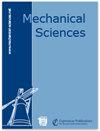Dynamic modeling of a metro vehicle considering the motor–gearbox transmission system under traction conditions
IF 1.5
4区 工程技术
Q4 ENGINEERING, MECHANICAL
引用次数: 2
Abstract
Abstract. As a vital means of transportation to alleviate urban traffic congestion, the metro vehicle has been developing rapidly in China during recent years. For the violent vibration and shock under the frequent switches between traction and braking conditions, higher requirements are put forward in the drive system. The dynamic performance of the traction motor and gearbox, which are the key elements in the drive system of the metro vehicle, is worthy of attention. Based on the classical vehicle–track coupled dynamics and the gear dynamics theory, a vertical–longitudinal dynamics model for a metro vehicle with frame-hung motors and gearboxes is developed in this paper. This model enables the consideration of some complicated excitations, such as external excitations (the track vertical irregularity) and internal excitations (the mesh stiffness and the dynamic transmission error). The established dynamics model is then validated by comparing the simulated results with the field test results in both time domain and time–frequency domain under traction conditions. Consequently, the established dynamics model is demonstrated to be capable of revealing the dynamic performance of the metro vehicle effectively, especially for the traction and transmission system in the entire vehicle vibration environment of a metro. In turn, the results indicate that the gear transmission has a great and lasting effect on the force state of the traction motors and gearboxes compared to its effect on the axle load transfer.考虑电动机-齿轮箱传动系统的地铁车辆牵引动力学建模
摘要地铁作为缓解城市交通拥堵的重要交通工具,近年来在中国得到了迅速发展。由于在牵引和制动工况频繁切换下的剧烈振动和冲击,对驱动系统提出了更高的要求。作为地铁车辆驱动系统的关键部件,牵引电动机和变速箱的动态性能值得关注。基于经典的车轨耦合动力学和齿轮动力学理论,建立了车架悬挂式电机和齿轮箱地铁车辆的纵、纵向动力学模型。该模型可以考虑一些复杂的激励,如外部激励(轨道垂直不规则性)和内部激励(网格刚度和动态传动误差)。在牵引工况下,将仿真结果与现场试验结果进行时域和时频对比,对所建立的动力学模型进行了验证。结果表明,所建立的动力学模型能够有效地揭示地铁车辆的动力学性能,特别是地铁全车振动环境下的牵引传动系统的动力学性能。结果表明,相对于对轴载传递的影响,齿轮传动对牵引电机和齿轮箱受力状态的影响更大、更持久。
本文章由计算机程序翻译,如有差异,请以英文原文为准。
求助全文
约1分钟内获得全文
求助全文
来源期刊

Mechanical Sciences
ENGINEERING, MECHANICAL-
CiteScore
2.20
自引率
7.10%
发文量
74
审稿时长
29 weeks
期刊介绍:
The journal Mechanical Sciences (MS) is an international forum for the dissemination of original contributions in the field of theoretical and applied mechanics. Its main ambition is to provide a platform for young researchers to build up a portfolio of high-quality peer-reviewed journal articles. To this end we employ an open-access publication model with moderate page charges, aiming for fast publication and great citation opportunities. A large board of reputable editors makes this possible. The journal will also publish special issues dealing with the current state of the art and future research directions in mechanical sciences. While in-depth research articles are preferred, review articles and short communications will also be considered. We intend and believe to provide a means of publication which complements established journals in the field.
 求助内容:
求助内容: 应助结果提醒方式:
应助结果提醒方式:


